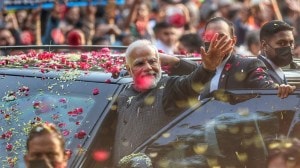Murder most foul, city most free
Canals shine in the winter sun along the promenades of Amsterdam. The road from Dam Square to the Tropical Museum runs through a typical Eur...

Canals shine in the winter sun along the promenades of Amsterdam. The road from Dam Square to the Tropical Museum runs through a typical European town centre. Medieval buildings and modern shopfronts rise from cobblestone streets. Brown leaves drift to the ground as cyclists thread past office-goers. Roses dance in windows. On the morning of November 2, controversial Dutch filmmaker 47-year-old Theo Van Gogh, great-grandnephew of the famous painter, dropped his son to school as usual and cycled to his editing center.
Everyone cycles in Amsterdam, even politicians. As Van Gogh cycled, another cyclist drew up next to him. A revolver was levelled. Shots rang out and Van Gogh fell to the ground. The assassin—a 23-year-old Dutch national of Moroccan descent—lunged and shot the filmmaker again, stabbed him repeatedly, shot him once again to make sure he was dead and stuck a note on his body.
As a dazed crowd stared, the youth shot his way out. The Renaissance buildings stood as mute witnesses to a public execution on a sunlit Amsterdam morning. Now a fortnight later, as the world celebrated Eid, Holland grappled with the coming of the Dutch jihad. After Van Gogh’s murder, there have been attacks on mosques across south Holland and retaliatory attacks on Christian schools.
Recently, in the town of Helden, a mosque was burnt, and locals pelted a church with stones. More than a dozen mosques have been attacked. Holland’s famed multiculturalism—smoking grass and visiting the redlight area are perfectly legal evening’s entertainment here—is suddenly hanging in the balance as intellectuals, middle-class professionals as well as youth speak angrily and often in overt racist tones, about the ‘‘Islamic threat’’.
Left liberals and the right wing are united in a new social conservatism. Says liberal writer Elsbeth Etty, ‘‘If the Muslims had a problem with Van Gogh, why did they simply not take him to court? A civilized society has its own ways of justice. Killing is not one of them.’’
Theo Van Gogh was called the ‘‘prophet of political incorrectness’’, the Bal Thackeray of Holland. A huge floppy-haired man from the haute bourgeoisie, he started from the extreme Left and ended in the extreme Right. He called Muslims names and said sweet smells reminded him of diabetic Jews burning in Auschwitz. He was charged with anti-Semitism and thrown out of almost every newspaper and magazine he wrote for. His film Submission— which prompted the murderous attack, depicted the abuses suffered by Muslim women at the hands of their husbands. The film’s opening shot is a scantily-clad ‘‘Muslim’’ woman with Koranic verses written all over her back and arms. The rest of the film is a short documentary showing battered women in a shelter, speaking about their suffering.
‘‘A totally innocuous film,’’ says journalist JBM Van Dam, ‘‘just that one small shot in the beginning. Nothing more.’’ Filmmaker Maarten Corbijn says politicians are always in danger, but filmmakers and columnists are not expected to get killed! ‘‘Theo was a soft-hearted guy. If you said, hey Theo you’re an arsehole, he’d be the first to agree. He just wanted attention. Wanted to shock people. Wanted to upset the Left church.’’
At one and half million, Muslims, mostly from Morocco and Tunisia, form ten per cent of Holland’s population. Muslim politicians like Ayaan Hirsi Ali, who was co-director of Submission along with Van Gogh says it’s important for liberals to distance themselves fom fanatics.
Liberals should create a ‘‘European islam’’ which is modern and democratic. Hirsi Ali is under police protection and unable to go to Parliament anymore because of death threats. ‘‘Europe is based on a structure of rights and obligations,’’ says publisher Robbert Bodegraven ‘‘to kill someone for their views, whether those views are acceptable or not, is contrary to the ideals of Europe.’’
Two years ago, Dutch politician Pim Fortuyn was killed by an animal rights activist. Fortuyn was an unabashedly racist and xenophobic politician whose popularity was growing steadily, particularly among the young.
The old fault lines of Europe are cracking open. The dark shadow of militant religiosity, Islamic and Christian, has fallen over the wine bars and open air cafes of Holland.
Photos


- 01
- 02
- 03
- 04
- 05





























